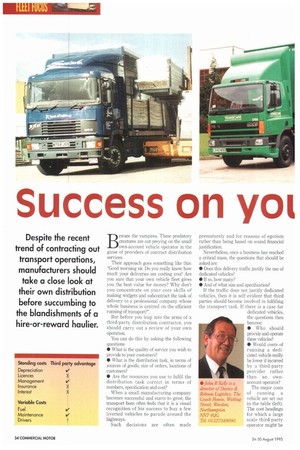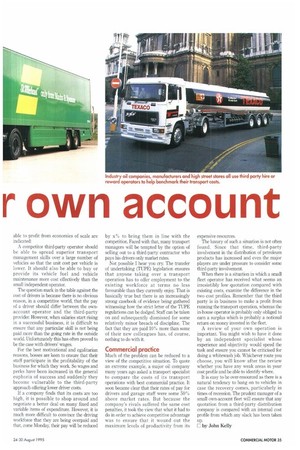Success on yot r own account
Page 36

Page 37

If you've noticed an error in this article please click here to report it so we can fix it.
Despite the recent trend of contracting out transport operations, manufacturers should take a close look at their own distribution before succumbing to the blandishments of a hire-or-reward haulier.
Beware the vampires. These predatory creatures are out preying on the small own-account vehicle operator in the guise of providers of contract distribution services.
Their approach goes something like this: "Good morning sir. Do you really know how much your deliveries are costing you? Are you sure that your own vehicle fleet gives you the best value for money? Why don't you concentrate on your core skills of making widgets and subcontract the task of delivery to a professional company whose whole business is centred on the efficient running of transport?".
But before you leap into the arms of a third-party distribution contractor, you should carry out a review of your own operation.
You can do this by asking the following questions • What is the quality of service you wish to provide to your customers?
• What is the distribution task, in terms of sources of goods, size of orders, locations of customers?
• Are the resources you use to fulfil the distribution task correct in terms of numbers, specification and cost?
When a small manufacturing company becomes successful and starts to grow, the transport boss often feels that it is a visual recognition of his success to buy a few liveried vehicles to parade around the highways.
Such decisions are often made prematurely and for reasons of egotism rather than being based on sound financial justification.
Nevertheless, once a business has reached a critical mass, the questions that should be asked are: • Does this delivery traffic justify the use of dedicated vehicles?
• If so, how many?
• And of what size and specification?
If the traffic does not justify dedicated vehicles, then it is self evident that third parties should become involved in fulfilling the transport task. If there is a case for dedicated vehicles, the questions then become: • Who should provide and operate these vehicles?
• Would costs of running a dedicated vehicle really be lower if incurred by a third-party provider rather than an ownaccount operator?
The major costs of running a vehicle are set out in the table (left). The cost headings for which a large scale third-party operator might be able to profit from economies of scale are indicated: A competitor third-party operator should be able to spread superior transport management skills over a large number of vehicles so that the unit cost per vehicle is lower. It should also be able to buy or provide its vehicle fuel and vehicle maintenance more cost effectively than the small independent operator.
The question mark in the table against the cost of drivers is because there is no obvious reason, in a competitive world, that the pay of a driver should differ between the ownaccount operator and the third-party provider. However, when salaries start rising in a successful business, it is difficult to ensure that any particular skill is not being paid more than the going rate in the outside world. Unfortunately this has often proved to be the case with drivers' wages.
For the best motivational and egalitarian reasons, bosses are keen to ensure that their staff participate in the profitability of the business for which they work. So wages and perks have been increased in the general euphoria of success and suddenly they become vulnerable to the third-party approach offering lower driver costs.
If a company finds that its costs are too high, it is possible to shop around and negotiate a better deal on many fixed and variable items of expenditure. However, it is much more difficult to convince the driving workforce that they are being overpaid and that, come Monday, their pay will be reduced by x% to bring them in line with the competition. Faced with that, many transport managers will be tempted by the option of selling out to a third-party contractor who pays his drivers only market rates.
Not possible I hear you cry. The transfer of undertaking (TUPE) legislation ensures that anyone taking over a transport operation has to offer employment to the existing workforce at terms no less favourable than they currently enjoy. That is basically true but there is an increasingly strong casebook of evidence being gathered witnessing how the strict letter of the TUPE regulations can be dodged. Staff can be taken on and subsequently dismissed for some relatively minor breach of discipline. The fact that they are paid 10% more than some of their new colleagues has, of course, nothing to do with it.
Commercial practice
Much of the problem can be reduced to a view of the competitive situation. To quote an extreme example, a major oil company many years ago asked a transport specialist to compare the costs of its transport operations with best commercial practice. It soon became clear that their rates of pay for drivers and garage staff were some 50% above market rates. But because the company's rivals suffered the same cost penalties, it took the view that what it had to do in order to achieve competitive advantage was to ensure that it wound out the maximum levels of productivity from its expensive resources.
The luxury of such a situation is not often found. Since that time, third-party involvement in the distribution of petroleum products has increased and even the major players are under pressure to consider some third-party involvement.
When there is a situation in which a small fleet operator has received what seems an irresistibly low quotation compared with existing costs, examine the difference in the two cost profiles. Remember that the third party is in business to make a profit from running the transport operation, whereas the in-house operator is probably only obliged to earn a surplus which is probably a notional return on money invested in the fleet.
A review of your own operation is important. You might wish to have it done by an independent specialist whose experience and objectivity would speed the task and ensure you cannot be criticised for doing a whitewash job. Whichever route you choose, you will know after the review whether you have any weak areas in your cost profile and be able to identify where.
It is easy to be over-resourced as there is a natural tendency to hang on to vehicles in case the recovery comes, particularly in times of recession. The prudent manager of a small own-account fleet will ensure that any quotation from a third-party distribution company is compared with an internal cost profile from which any slack has been taken up.
E by John Kelly




























































































































